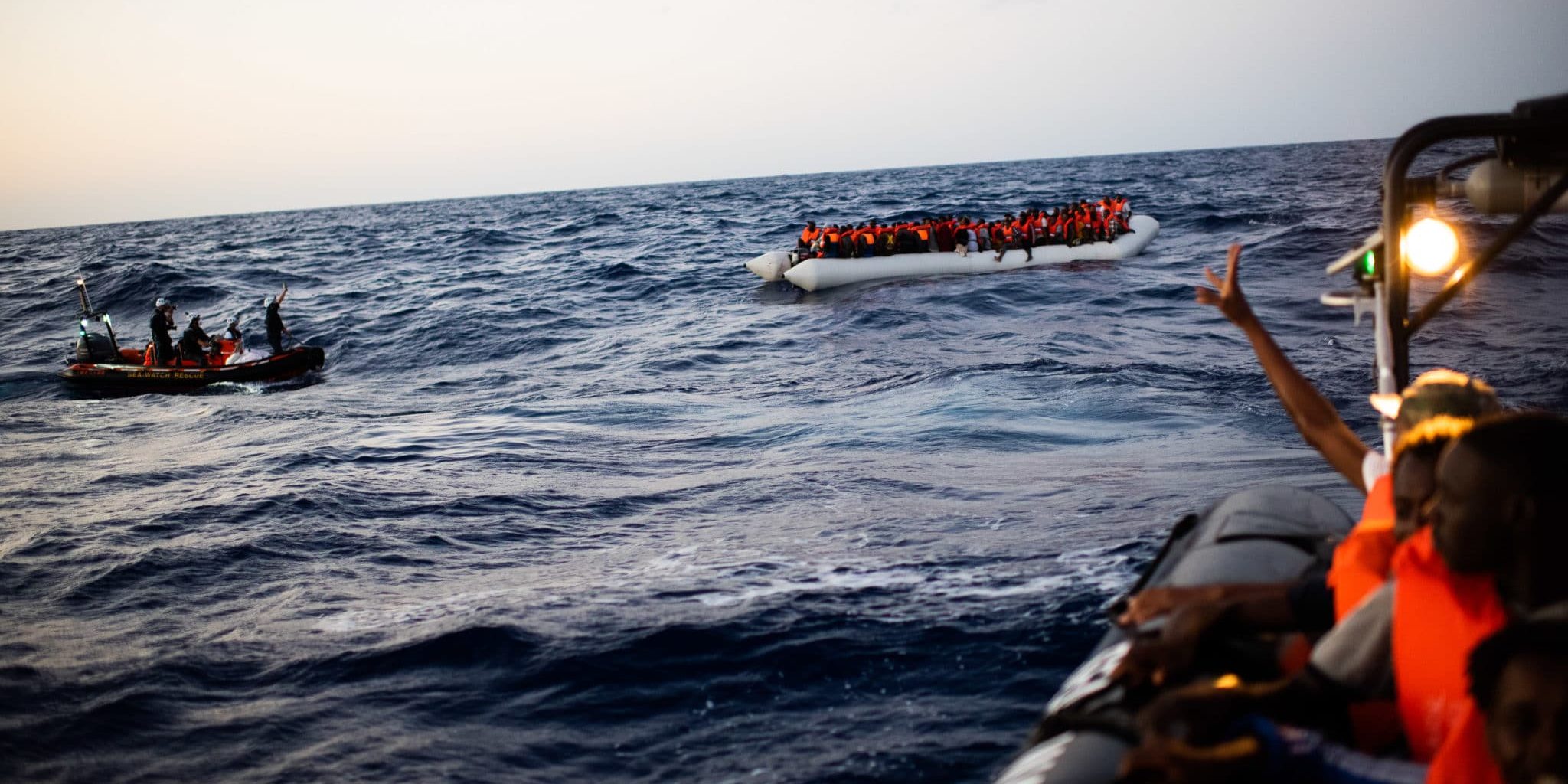The rescue ship Sea-Watch 4, which left for its first mission on August 15, rescued more than 200 people within 48 hours. Due to the arbitrary blockade of civilian rescue ships by European states, Sea-Watch 4 was the only active rescue ship to set off for the Mediterranean. This European blockade of sea rescue and its inhumane migration policies are deadly: last week, dozens of people drowned fleeing off the Libyan coast.
The sea rescue vessel Sea-Watch 4 had left the port of Burriana (Spain) on August 15. The Sea-Watch 4 is currently deployed in the central Mediterranean and is a joint project of United4Rescue, Sea-Watch, and Doctors without Borders.
On August 22, the crew of Sea-Watch 4 was able to rescue seven people who had been in distress about 45 miles off the Libyan coast. The boat was first sighted by the ship Louise Michel, whose crew stabilized the situation and requested the help of Sea-Watch 4 as a larger and better-equipped vessel.
In the early morning hours of August 23, the crew of Sea-Watch 4 sighted another distress case in international waters, about 30 miles off Libya. The 97 passengers of the overcrowded and unseaworthy dinghy were recovered and brought aboard Sea-Watch 4, where they received medical care from the crew of Doctors Without Borders. Among the rescued are women, children, and unaccompanied minors.
While the weather conditions were deteriorating, the responsible authorities as well as Sea-Watch 4 were informed by the organization AlarmPhone about a distress at sea with around 100 people about 50 nautical miles off the Libyan coast. The boat was discovered by the oil tanker VOS Triton in the early morning of August 24. Shortly afterward, the ship Louise Michel reached the dinghy, supplied the people with life jackets, and observed the boat’s situation until the arrival of the Sea-Watch 4, which is better equipped both for the rescue and for the medical care of the people. Despite two-meter high waves, all persons were safely brought on board the Sea-Watch 4. Many of them were weak and disoriented at the time of their rescue and showed symptoms of severe exposure to petrol fumes. After an assessment by the crew of Doctors without Borders, emergency showers were provided, and people with fuel burns, dehydration symptoms, hypothermia, and symptoms of poisoning by petrol fumes were treated.
“Within a few hours of our arrival in the search and rescue zone, we were already informed about the first distress case. The fact that we were engaged in two more rescues in less than 48 hours shows once again the necessity of civil sea rescue in the Mediterranean. However, our commitment is and remains a symbol of the European Union’s failure, which is refusing to do its duty and letting people drown at its borders. We are happy to have more than 200 people safely on board the Sea-Watch 4, but for the people who drowned last week in the Mediterranean Sea, any help came too late. If European states would not have detained civil rescue ships with absurd allegations, these people might still be alive. The European Union and its inhuman actions are solely to blame for these deaths,” said Philipp Hahn, Head of Operations on the Sea-Watch 4.
“The majority of those rescued this morning were weak and disoriented, smelling strongly of gasoline and exhibiting symptoms of fuel inhalation. Over 90 people required emergency showers for exposure to the gas used to power the engine, which generates noxious fumes and is highly corrosive when mixed with salt water. The MSF medical team continues to monitor for the development of burns, while following up with over 30 patients who presented with acute hypothermia. The longer people are left at sea without access to food, water or shelter, the higher the risk of significant health complications. And that is without even considering the risk of death by drowning. Speaking as a medic, seeing people risking their lives at sea in order to seek safety, is to be confronted with a devastating reality”, says Barbara Deck, Medical Project Coordinator of MSF.
“Within 48 hours, the crew of Sea-Watch 4 rescued a total of over 200 people. This quick rescue shows how urgent the issue of sea rescue in the central Mediterranean is. We are really grateful that after all these months of waiting our alliance ship could finally save lives”, said Thies Gundlach, board member of the alliance United4Rescue.
While in the past months thousands tried to escape Libya in boats unfit for sea, Malta and Italy refused to rescue people in distress and closed their ports to NGO ships. Almost all active rescue ships, including the Sea-Watch 3, are detained in Italy because of alleged safety deficiencies or are prevented from operating in the Mediterranean because of requirements that are impossible to be fulfilled. These arbitrary blockades show once again the political agenda behind these detentions. Europe’s isolation and blockade policy continues to be deadly: last week, according to the IOM (International Organization for Migration), at least 45 people drowned in the Central Mediterranean, including five children. The organization AlarmPhone reports of further deaths.











